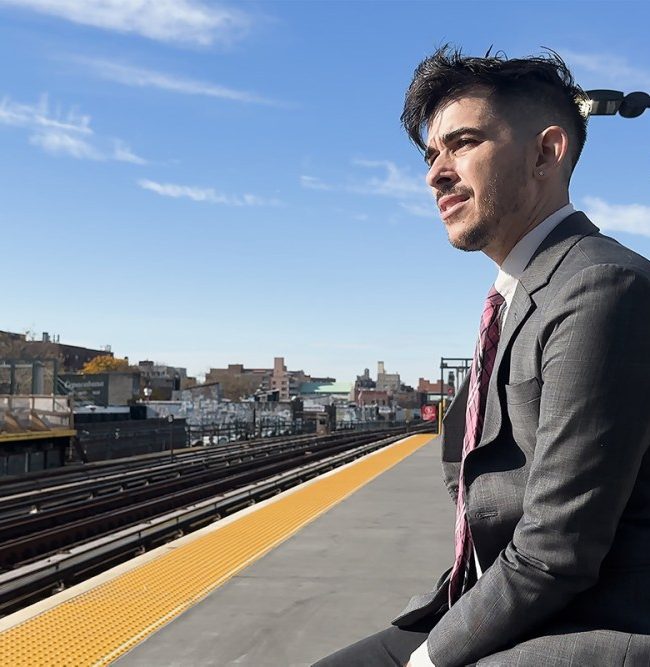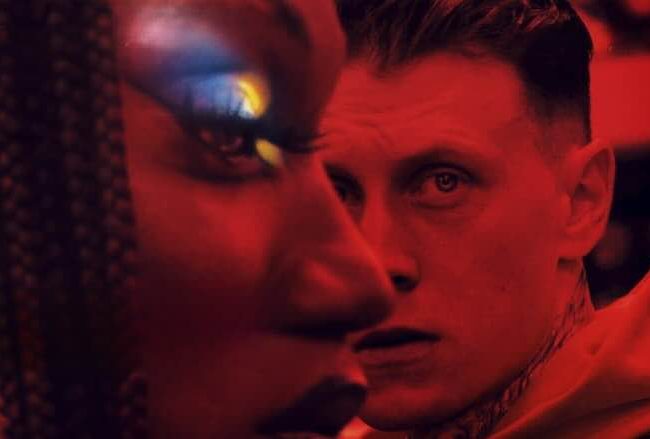A Conversation with Jonathan Wysocki (DRAMARAMA)
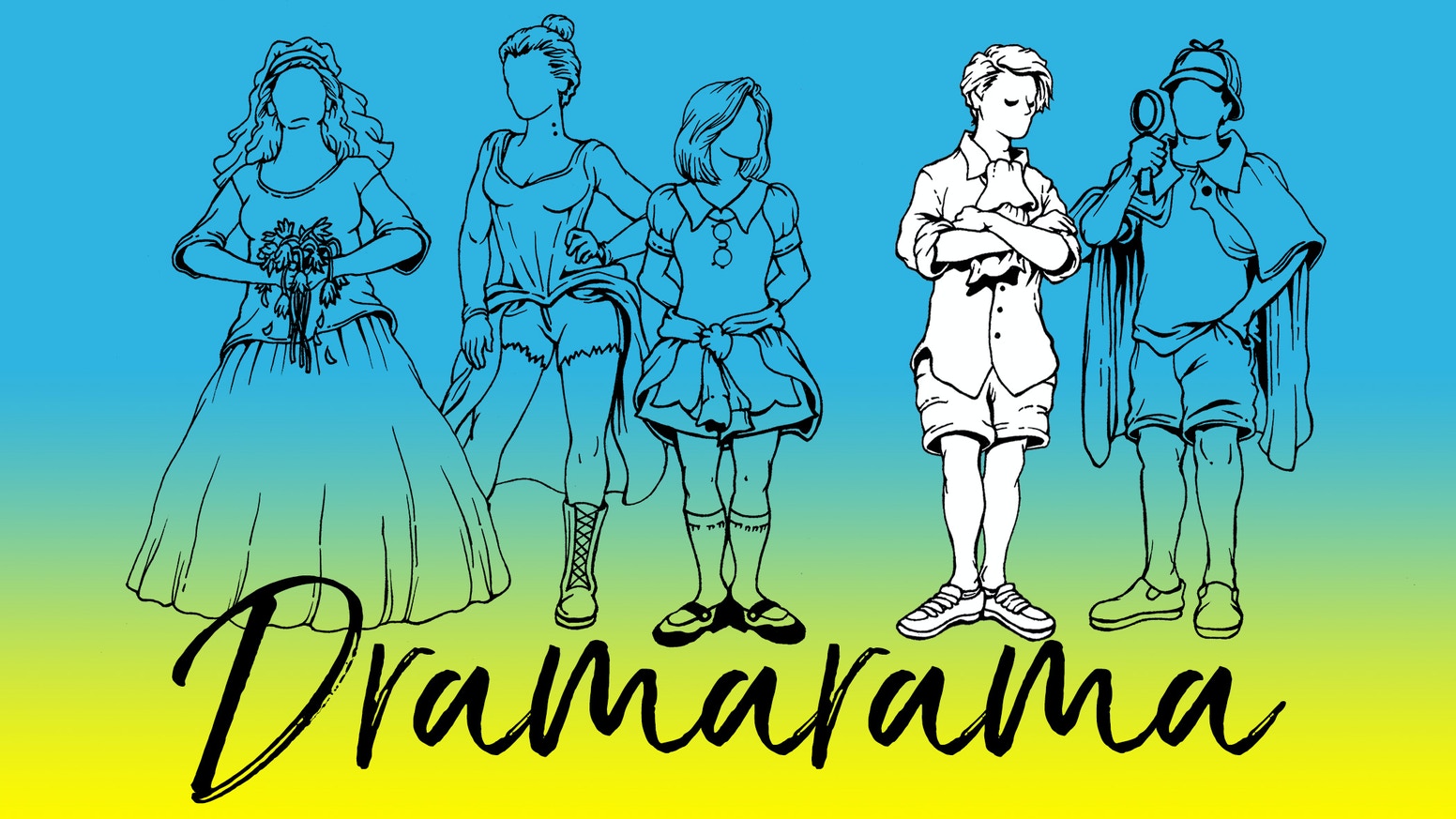
Jonathan Wysocki’s film Dramarama could not be more tailor-made for me. I went to Catholic high school in the ’90s and I was a drama nerd…
Jonathan Wysocki: Yeah, you are basically me.
Hammer to Nail: Yeah, I might as well just launch right into the interview that I had with Jonathan, because his film about a closeted teen struggling to part ways with his four high school drama friends at their final murder mystery party before they leave for college was basically a look back at actual events in my life. I caught up with him shortly after the film took home the top prize in the LBGTIA category at the Oxford Film Festival.
JW: I didn’t go to a Catholic high school, but I did go to Catholic parochial school up to eighth grade and was staunchly Catholic in my high school and started in drama as a little kid. So yeah, drama people are many people, and will always be my people probably.
HtN: I think I was one second into this film and I was like, “Oh yes, I know these kids. These were my weekends.” And yes, apple juice, sparkling apple juice.
JW: Oh wow, right down to that.
HtN: Extensive murder mystery parties. I mean, we didn’t do murder mysteries, but we did dress-up theme parties.
JW: That’s so interesting because obviously that’s pre-internet, so how did we all do the same thing? Do you know what I mean? It’s kind of fascinating, the collective unconscious of the high school drama kid somehow was…It was , oh yeah, of course you’re going to have a costume party.
HtN: I don’t know if it was the same for you, but I remember as a freshman or sophomore, you just worshiped the seniors and the juniors. So traditions just got handed down. And when we were told we would go to parties and we would practice kissing because that’s what we did, that was how I learned to kiss.
JW: Right. Yes, no, absolutely.
HtN: So Jonathan and I were joking via email that we could probably spend 25 minutes or 25 hours just trading high school stories, so, but because I do think we had a very shared experience. But so tell me Jonathan, how much of this film is based on your own actual personal life?
JW: That is a good question. I started the script by reading my high school diary.
HtN: I’m so glad you kept one.
JW: Oh yeah. Oh yeah. And it is full of cringy stuff. From cover to cover, one big cringe factory. But I kind of wanted to know what were my thoughts and my feelings and my hopes and my fears and my dreams, and just kind of get into that mindset a little bit. And I’m still friends with my friends from high school as well, so I thought about them a lot and who they were then. And that was kind of the basis of the script biographically. And then I added layers of fiction on top of that.
HtN: Is there a scene that when you initially said, “I’m going to make this film, I’m going to make this script,” that kind of existed as a kernel of like, “This is definitely in it,” and it ended up in the film pretty much the way you originally imagined it?
JW: Oh, a lot of things. Yeah. Just like weird details from my life. Definitely the murder mystery party, the arrivals at the beginning, the fart jokes in terms of …This still, just to show you how how deep the fact and fiction go, when my friends and I, if we go away for a weekend or something, we still do that fart jokes thing before we go to sleep. Even weirder detail, the flashlight homosexual game.
HtN: Really?
JW: That was real. We used to play that. I don’t even know what that game is.
HtN: I love that though. That was one of the moments that I was like, “Oh, what a fun activity.” Because in my background too is improv. So I always think about, if you went through a good drama program, you brought in those kinds of Viola Spolin games. And to me that felt like one of those drama games of like Freeze.
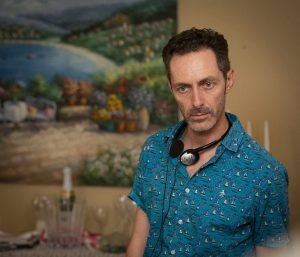
Filmmaker Jonathan Wysocki
JW: Yes, no, absolutely. And I think that was kind of a bit of the lightning in the bottle that I wanted to try to recapture, is just that drama kids, they improv at the drop of a hat. You can have a serious conversation and then all of a sudden someone starts improving and it takes everything in a different direction and then it brings it back into reality. And that sort of flow that goes from playfulness to being serious again, back to playfulness, is something that I was definitely trying to recreate in the script.
HtN: So I think one of the things that your film does so effectively, and it is really kind of the most important thing about this film, is that you have such a strong ensemble of characters, of actors, who have brought such a life to these people that it did really feel like I was getting a window into a group of friends. They have such great interplay. I would love to know a little bit about your casting process, where you found these kids. And also, then how did you kind of mold them into a group of kids that really felt like they’d been hanging out for three to four years?
JW: Sure. Yeah. I love the cast. I think that they’re amazing and every time someone compliments them, I just feel like a proud dad or something because I love them so much. And they’re such nice people in real life. But basically I hired casting directors, Sunny Boling and Meg Morman, who have been around for decades and they’re former theater kids so they got the script immediately and they knew that the script was going to be tricky because all the characters have to do comedy and drama. They have to have that range. They saw hundreds of actors here in Los Angeles. I have been through projects before, feature projects, where it was all about attaching big names in order to get the financing. And because this project was so low budget, I wasn’t beholden to anyone in terms of that. So I was able to really just cast the best actor for each role. I did not have to wait, I didn’t have to put a square peg into a round hole. So really, those kids are so great because they’re really the best person we saw for each of those roles. And unfortunately we didn’t have the money to be able to bring them in the room together to play off of each other or to have rehearsals beforehand, so I had to really hope that, based off of our casting, they would click together. And they did.
HtN: What did you do on set to to make it feel like that?
JW: I’m a big believer in terms of directing of giving room for creativity and then knowing when you need to pull back on that. So I try to keep it as loose as possible on set and just let the actors know that they have freedom to invent. And I think that the actors themselves were good at improv, if that makes sense. So when I let them loose, they knew that they could infuse their own style into what they were doing. And by day three of the set, they just inhabited those characters so easily because I think they felt the freedom that they could play, if that makes sense. And that was fun to them because they like that in real life.
HtN: Let’s talk about dealing with the religious aspects to this film and having an LGBTQ identity in the face of judgment from friends, from peer groups, from institutions. I know that we’re in a very different place. That’s hopefully the one thing that has changed since the 1990s. Tell me a little about-
JW: It might depend on where you live in the country, but yes.
HtN: Yes. I agree. Yes. I should not speak so quickly. I have no idea what it is like to be 2010s. I just hope it’s better than when I was in school. Tell me a little bit about revisiting those thoughts that you hadn’t for a while, and what you wanted to make sure you got into the film.
JW: Sure, absolutely. I grew up very religiously. All my friends did. It was just an environment where everyone was Christian and I think oftentimes in indie films, Christianity is kind of portrayed broadly unless it’s a film that’s made by Christians for Christians, which is sort of a separate market, if that makes sense.
HtN: Pretty awful, normally.
JW: Yeah. Well, I didn’t want to say so, but yes.
HtN: Yeah, but I can say that because I don’t have to worry about offending those people.
JW: They’re usually pretty heavy handed.
HtN: My mere existence offends those people.
JW: So I felt there was really more nuance in my memory in terms of who we were, even on subjects like abortion. In my friend group, there were pro-choice people and pro-life people and we were all Christian and somehow it turned into philosophical debates, but it didn’t mean that we couldn’t be friends with each other, if that makes sense. And then some people lost their faith and some people did not. That spectrum was very interesting to me and I’d never really seen it before in an indie movie. Especially with the teenagers. So I feel like it was a snapshot of my life at that time, and I hope that the religious aspect of it maybe is more of a bridge builder than maybe some other films are.
HtN: It’s funny. I agree that back then, things that now seem like reasons why you couldn’t be friends with somebody, back then I felt like we did have conversations about them. And I don’t know if the warring versions of news media that are ripping us to the sides of every issue is making it more difficult for people. Because I feel like high school is when you start to form those opinions, and it’s very important to be able to have those conversations with friends so that your opinion can come from yourself rather than something dictated to you by your parents.
JW: Absolutely. And I think that one of the things I try to do in the writing is sort of show that awkward time between parenting your parents, like when the characters are clearly just mouthpieces for what their parents have taught them, versus when you’re staking your own territory as you leave high school. And you’re like, “Okay, no, this is who I am and what I believe in.” Yeah, I think that obviously cancel culture is front and center in a lot of discussions today, and purity politics and how pure are you in terms of your beliefs and stuff like that. I don’t know. I feel like we got into some pretty thick weeds when we were in high school and still survived friendships. It’s interesting. I just wonder if that’s different now.
HtN: Yeah, I agree. So you said you’re still pretty close or at least in contact with your friends from high school. Have any of them seen this film yet?
JW: Oh yes. Yeah, no. It was a stressful experience. I had them all read the script and I had individual conversations with them about that and then they watched the film. And there’s definitely a spectrum because not everyone is who they are now as they were then. So for some of them it’s cringy to watch the movie. They’re like, “Oh, oh. I remember.”
HtN: So they not only saw the film, but they often saw themselves in the film?
JW: Yes. And it wasn’t always a joyful experience. But I think that ultimately they’re excited to be preserved. That our friendship is preserved in some way on film.
HtN: I think that no matter what the individual things are, what comes across is the tremendous friendship and bonds that we form at that time. Especially for me being in drama was it’s always about being an outsider. And I’ve always thought that part of why I felt like I was able to come out when I did, which was much, much later in life. But part of it was that I already had that experience of being an outsider in drama. Because I think that in high school, the drama kids are, Glee aside, were not the cool kids.
JW: No, definitely. And to add off that, another thing that I find really interesting is that drama, unlike any other activity, gives you this freedom and permission to do things that you could never do in your normal life. You can put on a character and be a certain way or act a certain way that maybe you couldn’t in a sport that you’re playing or in band or whatever, there’s this interesting sort of access to trying on different identities that I think is really great. I think particularly for people, there’s a connection there between why the queer people end up in drama and then there’s this access to sort of be a different person and try on different things. And I think that it’s kind of a lovely bridge in some ways for teens.
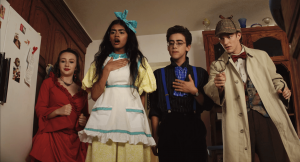
A still from DRAMARAMA
HtN: Let’s talk about The Glass Menagerie, which is an old play that I think that it has sort of a universality that I think we’ve all been forced to read it or at least perform it in class as an assignment. So talk about choosing that play as a backdrop for their passive aggressive history and what that meant for the story.
JW: Glass Menagerie was a play that I insisted we do senior year of high school. Even though I was firmly in the closet, I clearly connected to its queerness. I think what’s interesting about Glass Menagerie is not only is it kind of a standard for high schools to do, and obviously because it’s one of the most autobiographical things that Tennessee Williams made, it does have this sort of inherent queerness to it. The other thing I really love about it, in context of Dramarama is it’s sort of nostalgia because it’s all about looking back and it has that frame structure that’s so interesting. And that’s deeply kind of what I was doing in terms of trying to recreate the past in a way and try to frame the past. So it was something that, for me personally, I really connected to and felt like, in a kind of meta way, it was kind of what I was doing with Dramarama.
HtN: And who did you play in high school?
JW: I was Tom.
HtN: Of course. One of the things that I found very courageous in this film is the end and the fact that there’s more that’s left unsaid than said. And I think that for me, that was another thing that really rang true to the high school experience, which is these are your very closest friends, the people that you trust more than anyone, and yet you still can’t always completely trust them with our deepest secrets. Can you talk a little bit about that choice and if you had any pushback on that? Because you didn’t tie everything up nicely.
JW: Absolutely. No. I guess the first part of it is that I was gay, one of my close friends in our friend group was also gay, and neither of us came out in high school because of our environment. And the time as well. I think early 90s, it was just not …There was no gay straight alliance on campus or anything like that. So that truth seemed very important to put in, the fact that just sometimes it’s just not okay to come out because you’re ready. But I also felt like I’ve never really seen it in a film before, in that coming out films always sort of have that big moment where the character comes out. And because it was not my experience in high school, I just wanted there to be a model for a version of that where it just didn’t happen in the film and that’s okay. That coming out is such a personal thing and it’s so much about timing and it’s so much about environment and that if those things are not right, it’s okay to wait. It’s okay to wait for those things to be right so that you feel safe. And even with your best friends, it might not be right.
HtN: It’s not a Coming Out film. It’s a Staying In film, essentially
JW: Yes. And I think that maybe it might be frustrating to some people to not have that moment for Gene, but I feel like hopefully the fact that, and this I think is also very true to life, the straight girlfriend, Ally character fully knows, is like, “Oh guys, I’m on … ” And has that moment of acceptance. She sort of leaves the door open for Gene. I feel like that emotional beat hopefully makes up for the fact that Gene doesn’t come out.
HtN: Yeah. I think that’s really interesting. I’m really curious to see what other people’s response is to that moment. Because I think one of the ways that you get away with it, and I mean that in the nicest possible way, is that you’ve set this in the 90s. Whereas if it was set now, I don’t think people would let you off the hook. I think people would say, “Well no, they need to come out. That needs to be part of the experience.” And I think that you and I both know that that was not part of the experience in the 90s. And in fact, with many of our high school friends, we didn’t come out till years later. And then you have that conversation where it was like, “Oh, I thought you were trying to come out to me then. Here’s the moment I remember.” I had that experience over and over again, just recently with my high school friends, kind of admitting to me that there were conversations they thought we were about to have, that we didn’t have.
JW: That’s so interesting. I find that unpacking part, that retrospect part, fascinating. I’ve actually done it multiple times with my friends because it’s almost like a story that I want to keep hearing in terms of what they knew and what they were waiting for versus when I actually did it, when I actually did come out to them. Because I think because that love is there so deeply that there’s something really sweet and powerful about knowing that they were ready to catch me before I was ready to tell them.
HtN: Absolutely. In terms of Dramarama, what do you think our characters needed to hear in order for it to be okay for them? Do you think they were waiting for something in particular?
JW: Yeah. I think in terms of this particular film, I think that it’s pretty tied to religion. And I think it is still tied to religion for a lot of people today, that sort of confluence. It’s interesting that Gene is able to come out as agnostic before he’s able to go out as gay. It’s like, wow. Boy, it’s that taboo and you’re worried that things are going to change that much. So I think it is, in some ways, the further Christianity can get into accepting queer people, the easier it would be for my characters to step into their queerness. And I think that that’s a project that has obviously gotten better decade by decade, but we’re not there yet and it has a long way to go. The largest religion in this country is Christianity, and I think that Christianity, it just has to keep evolving and it has to keep creating those bridges because it’s what the future is going to require of Christianity if Christianity is going to stick around. That is for sure.
– Bears Rebecca Fonté (@BearsFonte)








